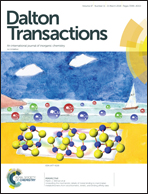Influence of Lewis acid strength on hydride transfer to unsaturated substrates†
Abstract
Hydride transfer promoted by the coordination of a substrate molecule to a Lewis acid is a critical step in many catalytic transformations. This computational study investigates the nature of the interaction between a polar substrate molecule and a Lewis acid by examining the influence of Lewis acid strength on the ability to reduce (transfer a hydride to) the coordinated substrate molecule. To investigate this interaction, the coordination of 10 probe substrates to seven Lewis acids was analyzed. Coordination of the probe substrate molecules to a Lewis acid resulted in a more favorable reduction of the substrate molecule by 20–70 kcal mol−1. Further examination of the coordination of the substrate molecules to Lewis acids of varying Lewis acid strengths resulted in a direct linear correlation between the ability of the Lewis acid–substrate adduct to accept a hydride and the Lewis acid strength. The linear correlations also revealed that between 44 and 70% of the Lewis acidity of the Lewis acids translated to the Lewis acid–substrate adducts. From the results obtained in this study, the minimum Lewis acid strength needed to activate the substrates for the reduction with [BH4]− and the implications of employing a Lewis acid to promote the reduction of an unsaturated polar substrate in catalytic reactions are also described.



 Please wait while we load your content...
Please wait while we load your content...